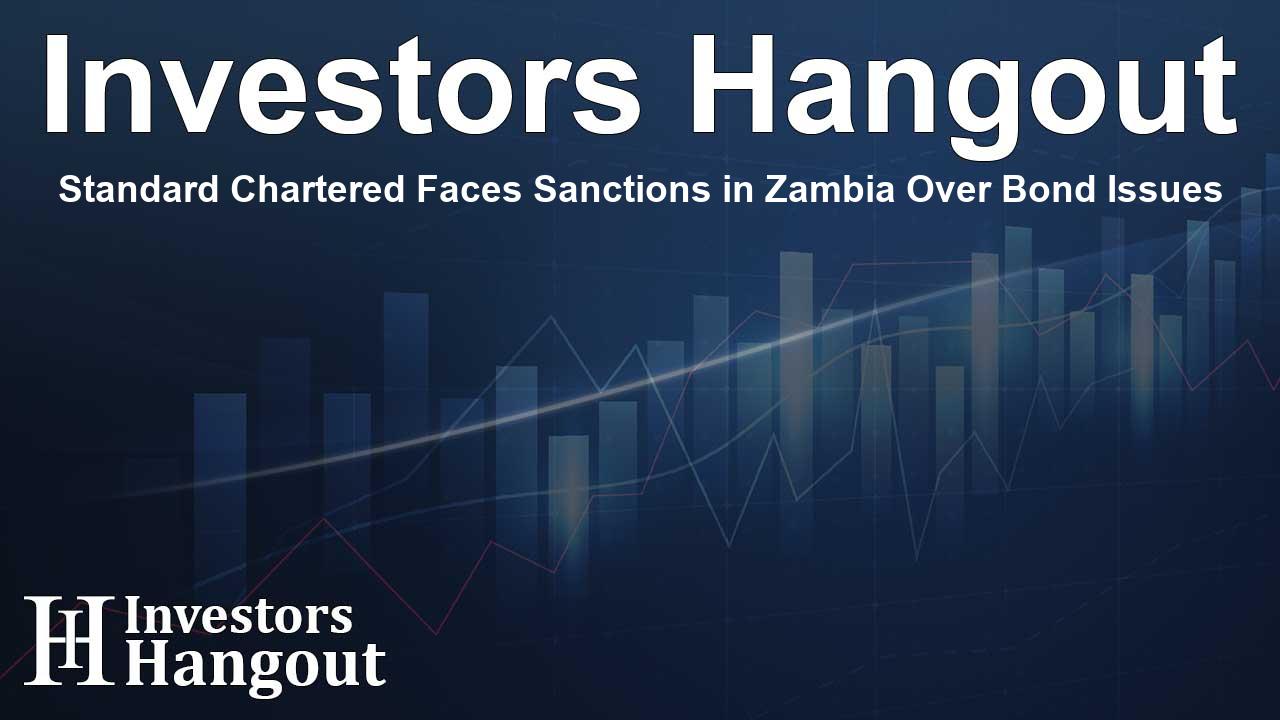Standard Chartered Faces Sanctions in Zambia Over Bond Issues

Standard Chartered's Regulatory Challenges in Zambia
Zambia's Securities and Exchange Commission (SEC) has recently taken action against Standard Chartered for its involvement in the mis-selling of bonds related to a Chinese property firm. This situation has cast a spotlight on the bank's operations in the region, particularly as it seeks to navigate complex regulatory landscapes.
Details of the SEC's Findings
The SEC's investigation revealed that Standard Chartered had failed to disclose critical details about the bonds it sold to clients. These bonds were tied to Sino-Ocean, a state-backed Chinese developer. The financial strains this firm faced have resulted in significant losses for investors, as the bonds have since defaulted and their value has plummeted.
Implications of Mis-selling
Mis-selling not only puts clients at risk but also jeopardizes the integrity of the financial markets. In this instance, the SEC identified that Standard Chartered imposed contract clauses that placed undue risk on the clients, contravening Zambian securities regulations.
Standard Chartered's Response
In response to the SEC's ruling, Standard Chartered has expressed its intent to appeal the decision. The bank emphasizes its commitment to adhere to local regulatory standards. As they assess the situation, the bank aims to clarify the details surrounding the findings.
Understanding the Regulatory Framework
The Zambian regulatory framework allows for various forms of sanctions, including fines and formal reprimands. However, the SEC does not have the authority to mandate customer compensation in cases of mis-selling, which leaves clients seeking recourse with limited options.
A Glimpse into Standard Chartered's Operations
Standard Chartered has had a long-standing presence in Zambia, having operated in the country for nearly 120 years. This history makes it the oldest bank in the nation. However, the bank is now reassessing its strategy in Africa, including plans to divest from its wealth and retail banking operations in Zambia, along with similar intentions in Botswana and Uganda.
Challenges in the African Market
Standard Chartered's recent movements highlight a broader trend of banks reevaluating their positions in challenging markets. The bank has already exited operations in countries like Tanzania and has sold subsidiaries in other African nations, which raises questions about its future aspirations in the region.
The Path Forward for Standard Chartered
As Standard Chartered moves forward amidst these challenges, its ability to navigate regulatory scrutiny will be crucial. The bank's response to the SEC's findings and its appeal process will be closely watched by investors, clients, and regulators alike.
Building Trust with Clients
Rebuilding trust will require more than just legal compliance for Standard Chartered; it necessitates transparent communication with clients and a commitment to ethical practices. The outcome of this situation could shape the bank's reputation and operational strategies for years to come.
Frequently Asked Questions
What sanctions has Standard Chartered faced in Zambia?
Standard Chartered has been sanctioned by Zambia's SEC for mis-selling bonds related to a Chinese property company, failing to disclose critical information.
Why are the bonds significant?
The bonds issued by Sino-Ocean defaulted, resulting in financial losses, highlighting the risks associated with such investments.
What does the SEC's investigation reveal?
The investigation showed Standard Chartered's use of exclusionary contract clauses, placing undue risks on clients, violating Zambian securities regulations.
What is Standard Chartered's response?
The bank plans to appeal the SEC's decision, asserting that it respects the commission's findings and is reviewing the situation comprehensively.
How does this affect Standard Chartered's operations in Africa?
This controversy adds to the bank's ongoing reassessment of its presence in Africa, influencing its decision to potentially divest from several regional operations.
About The Author
Contact Dominic Sanders privately here. Or send an email with ATTN: Dominic Sanders as the subject to contact@investorshangout.com.
About Investors Hangout
Investors Hangout is a leading online stock forum for financial discussion and learning, offering a wide range of free tools and resources. It draws in traders of all levels, who exchange market knowledge, investigate trading tactics, and keep an eye on industry developments in real time. Featuring financial articles, stock message boards, quotes, charts, company profiles, and live news updates. Through cooperative learning and a wealth of informational resources, it helps users from novices creating their first portfolios to experts honing their techniques. Join Investors Hangout today: https://investorshangout.com/
The content of this article is based on factual, publicly available information and does not represent legal, financial, or investment advice. Investors Hangout does not offer financial advice, and the author is not a licensed financial advisor. Consult a qualified advisor before making any financial or investment decisions based on this article. This article should not be considered advice to purchase, sell, or hold any securities or other investments. If any of the material provided here is inaccurate, please contact us for corrections.
